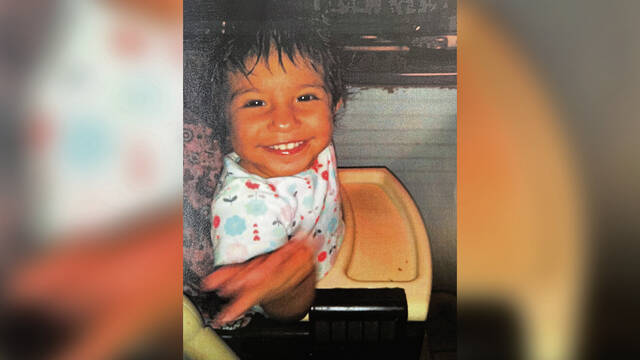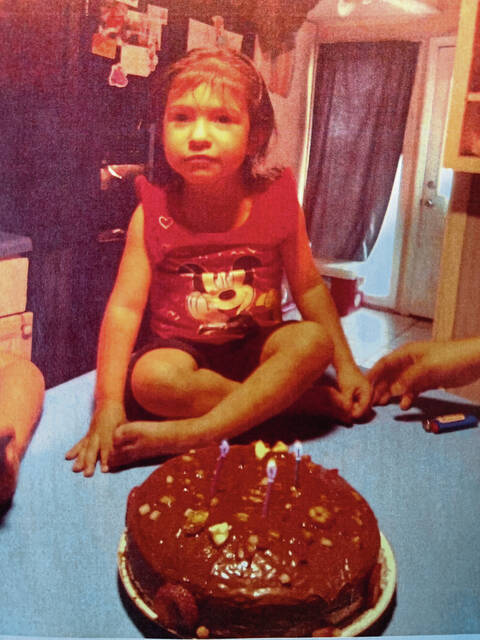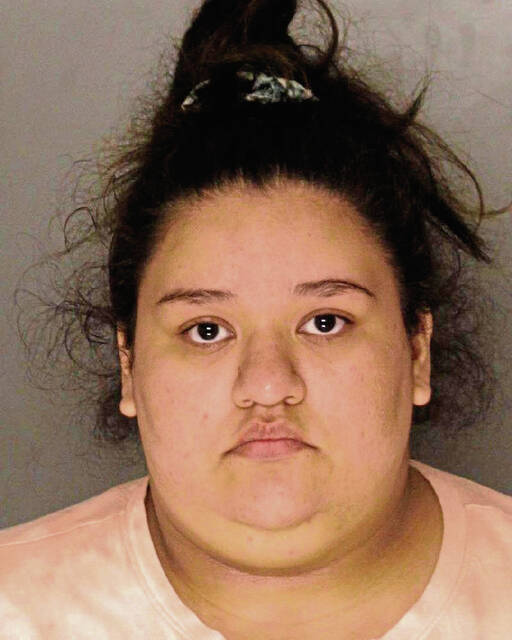Her sister and brother-in-law are already serving decades in prison for abusing and killing his 3-year-old daughter.
Now, it’s just a matter of time before Alexis Herrera joins them.
On Wednesday, Herrera, 24, of Oakmont pleaded guilty to a general count of criminal homicide for the June 9, 2020, death of Bella Seachrist.
But in a legal move rarely used in Allegheny County, Herrera and her lawyer have agreed to let a judge decide what specific type of homicide she committed — and how long she will spend in prison.
The range of possible prison time is enormous.
Often a plea deal between a defendant and prosecutors involves an agreement on the specific crimes, and those crimes carry clearly defined sentencing guidelines.
In Herrera’s case, though, there was no such deal. Instead, there will be a degree-of-guilt hearing, during which the prosecution will present evidence and witness testimony. It is expected to be held in August.
Then Allegheny County Judge Bruce Beemer will decide whether Herrera is guilty of first-degree murder, third-degree murder or involuntary manslaughter.
The possible sentences range from life in prison without parole for first-degree murder to no more than 10 years for involuntary manslaughter.
Because the victim is a child, third-degree murder would carry a mandatory minimum of 15 years in prison.
Herrera is the final defendant of the three people charged in the death that shook the Oakmont community.
First responders were called to the family’s home on 10th Street in Oakmont that afternoon, where they found Bella cold and wet in a bathtub. She was pronounced dead at a local hospital about an hour later.
The medical examiner found that Bella died from severe abuse and neglect. She also had been sexually abused.
A jury found Bella’s father, Jose Salazar-Ortiz Sr., guilty of third-degree murder, and he was sentenced in August to serve 33 to 66 years in prison.
Laura Ramriez, Bella’s stepmother, was found guilty in a nonjury trial before Beemer of first-degree murder. In September, he ordered her to serve life in prison plus 37 to 74 years.
Upcoming Local Events
-
Pittsburgh Reptile Show & Sale June 2ndToday 10:00 AMPittsburgh Reptile show & Sale at the Pittsburgh Mills Mall Unit 361 easy access at the 3North Entrance$6.00
-
Pittsburgh Reptile Show & Sale June 2ndToday 10:00 AMPittsburgh Reptile show & Sale at the Pittsburgh Mills Mall Unit 361 easy access at the 3North Entrance$6.00
-
Billy Price Album Release Event With Special Guests Billy The Kid & The RegulatorsFri, Jun 7 8:00 PMThe Pittsburgh Shrine CenterGet Tickets
-
Billy Price Band: Syria Shrine Center, Release Party for Person of Interest, with Billy the Kid & the Regulators, 8 pmFri, Jun 7 8:00 PMPittsburgh's Syria ShrinersGet Tickets
Deputy District Attorney Jennifer DiGiovanni on Wednesday recounted the final six months of Bella’s tortured life, which included being denied food, locked in a closet, tied to a banister and forced to hold her small frame — just 29 pounds when she died — over a toilet.
Bella was born in August 2016 out of her father’s affair. He had custody of her for about a year from August 2017 to 2018 and then sent her to live with relatives in North Carolina.
She remained there until September 2019.
Bella was healthy when she was returned to the care of her father and stepmother.
But, DiGiovanni told the court, Ramriez frequently punched Bella, sometimes knocking her out; she often needed to put the child under running water in the shower to wake her.
Herrera told investigators she moved into the house in January 2020 and saw her sister frequently beat Bella. She also said Ramriez kicked the little girl down the steps.
There were instances, the prosecutor said, when Herrera and Ramriez used glue and wet shoelaces to tie Bella to the banister in the home.
DiGiovanni said investigators found images, videos and text messages between Ramriez and Herrera that show and describe the abuse.
In some, Bella is seen bound and gagged with a blindfold over her eyes.
Herrera, who was sometimes left as Bella’s caretaker, abused the child on her own, as well, the prosecution said. She admitted to detectives that she withheld food from Bella, and that the child was permitted to eat only rice and water.
“She had planned on reporting Bella’s abuse to authorities but never did so,” DiGiovanni said.
In addition to pleading guilty to the general count of homicide, Herrera also pleaded guilty to two counts of aggravated assault, endangering the welfare of a child, unlawful restraint of a minor and conspiracy.
Defense attorney Michael Machen said he could not comment while the case is pending.
Bruce Antkowiak, a Saint Vincent College law professor, said pleading guilty to a general count of homicide and moving to a degree-of-guilt hearing is rare and often involves child victims.
Featured Local Businesses
In 2019 in Allegheny County, Joseph Gazzam entered that plea in the beating death of his 4-month-old daughter.
A judge found him guilty of third-degree murder and sentenced him to 21 to 42 years in state prison.
And in Armstrong County, Janet Crawford admitted to killing her 4-year-old daughter who starved to death in August 2003. A judge found her guilty of first-degree murder, and she is serving a life sentence.
Entering a plea to a general count of homicide can make sense for the defense, particularly in a case where a child has been harmed.
“You have an enormously sympathetic victim here and a case where the passions of people deciding guilt or innocence will be heightened,” Antkowiak said.
He said in Herrera’s case, if the defense thinks she is even slightly less culpable than her co-defendants, having the judge determine degree of guilt could result in a lesser verdict.
Additionally, because she is pleading guilty, Antkowiak continued, Herrera is showing the court she’s willing to accept responsibility for Bella’s death.
He said there are also benefits of such a plea to the prosecution.
They’re guaranteed a conviction, and they can focus during the hearing on proving the elements required for either first- or third-degree murder.
“It allows the prosecution to focus its evidence more precisely on those points that will be most relevant to the judge making the final call,” Antkowiak said.
Paula Reed Ward is a TribLive reporter covering federal and Allegheny County courts. She joined the Trib in 2019 after spending nearly 17 years at the Pittsburgh Post-Gazette, where she was part of a Pulitzer Prize-winning team. She is the author of “Death by Cyanide.” She can be reached at pward@triblive.com.
Upcoming Local Events
-
Pittsburgh Reptile Show & Sale June 2ndToday 10:00 AMPittsburgh Reptile show & Sale at the Pittsburgh Mills Mall Unit 361 easy access at the 3North Entrance$6.00
-
Pittsburgh Reptile Show & Sale June 2ndToday 10:00 AMPittsburgh Reptile show & Sale at the Pittsburgh Mills Mall Unit 361 easy access at the 3North Entrance$6.00
-
Billy Price Album Release Event With Special Guests Billy The Kid & The RegulatorsFri, Jun 7 8:00 PMThe Pittsburgh Shrine CenterGet Tickets
-
Billy Price Band: Syria Shrine Center, Release Party for Person of Interest, with Billy the Kid & the Regulators, 8 pmFri, Jun 7 8:00 PMPittsburgh's Syria ShrinersGet Tickets




